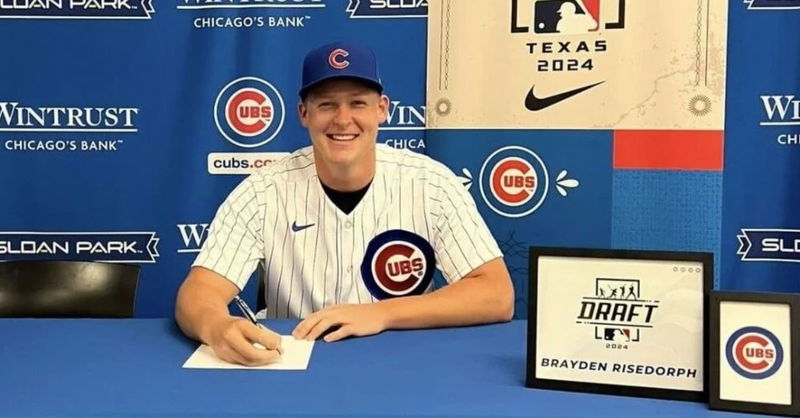
Getting to Know Cubs Draft Pick: Brayden Risedorph |
With their 20th and final pick of the 2024 MLB Draft, the Chicago Cubs went back to the pitching market, which shouldn't come as a surprise. After going bat heavy during the first two days of the draft, the Cubs focused on arms on day three, as five of their final six picks were pitchers.
That included their final draft selection, as the Cubs signed Indiana University RHP Brayden Risedorph. Another imposing figure on the mound, Risedorph may only be 6-3, but at 230 pounds, he has the solid build you look for in a pitcher. He is also a draft-eligible sophomore, which makes his contract situation interesting. Had he not signed with the Cubs, Risedorph would have had plenty of leverage. He could have returned to school and improved his draft stock if he had wanted. Instead, he chose to sign with the Cubs, and now it will be up to the Cubs to see how they utilize and develop him. Anytime you get drafted as a sophomore, your overall body of work is impressive. That isn't the case with Risedorph, who posted a 7-8 record in two seasons with the Hoosiers and a 6.30 ERA, including a horrific 8.32 ERA this season. His sophomore season was a nightmare, leaving plenty of questions about why he declared for the draft and why someone took a chance on him. His brief success in the Cape Cod league turned the Cubs heads as they continue to put much more stock into that league than most organizations. With that being a wood-bat league, you can see why, as the overall success these guys show there will go a long way in determining how far they can go at the next level. Far from being a polished product at this point, Risedorph is averaging 91.2 MPH with his heater but has been able to touch 94-95 at times, leaving the question of how much more velocity he can generate. To go with that fastball, he has an 87.3 MPH cutter that acts as a slider and an 81 MPH slider that serves as his slower breaking ball. When those secondary offerings are on, he can be tough to hit. The slower-than-normal spin rate makes those pitchers tougher to pick up, leading to plenty of swing-and-miss stuff. For him to achieve the success the Cubs are hoping for, he needs to develop his splitter a bit more, as that was used far more frequently toward the end of the season. Risedorph also needs to locate all of his pitches for strikes, as the more strikes he can throw early in the count, the more likely it will be that he can get his opponents to chase outside the zone. According to the metrics, for every 45 sliders he throws, Risedorph generates 12 whiffs on that pitch, just under 25%. That is borderline elite, as 27.5% of his whiff rates are considered elite, so you can see the potential in his overall work. Another thing that a lot of scouts have started to notice, especially when it comes to his fastball and slider, is the overall deception of those pitches. Both come from the same arm slot and have a similar spin rate, making them look identical out of the pitcher's hand. The only difference is that one falls off the table and is roughly six MPH slower than the other. The Cubs pay attention to those things more than most teams, and it has worked in their favor several times in the past. Another one of those selections is considered a long-term play; Risedorph is still in the early stages of his development, and the Cubs are getting their hands on him at the right time. Up close look at Brayden Risedorph (rhp, @IndianaBase). Left with the lead in back & forth slog. Brayden Risedorph has 2 strikeouts through 2 scoreless innings. One of the big reasons?
103 pitches | 56% strikes | 43% Sliders | 12 whiffs.
4.1IP, 4H, 5R, 5ER, 4BB, 6K.
FB: 89-94/95 (91.2 avg) | 2189 spin | 4 s/m
SL: 77-83 (81.0) | 2185 | 6 s/m
CUT: 86-89 | 2 s/m pic.twitter.com/utVLbfmO6m
His fastball and splitter look the same.... until they aren't.
Here's both pitches individually and then an overlay to see just how hard it is to tell the difference between the 2: pic.twitter.com/DvQVCi0t1m





